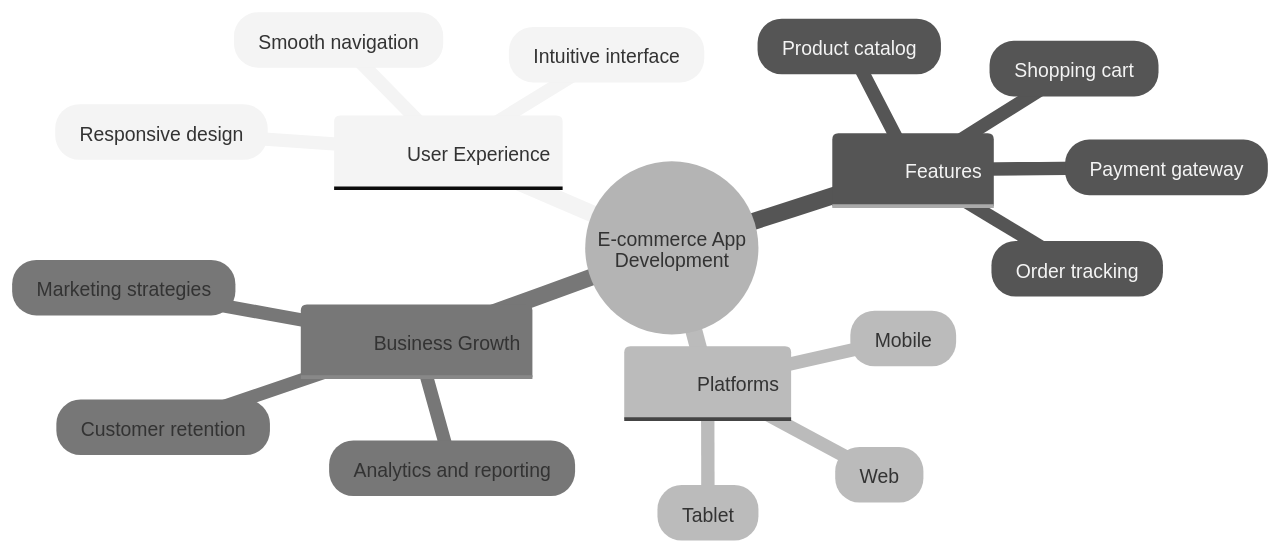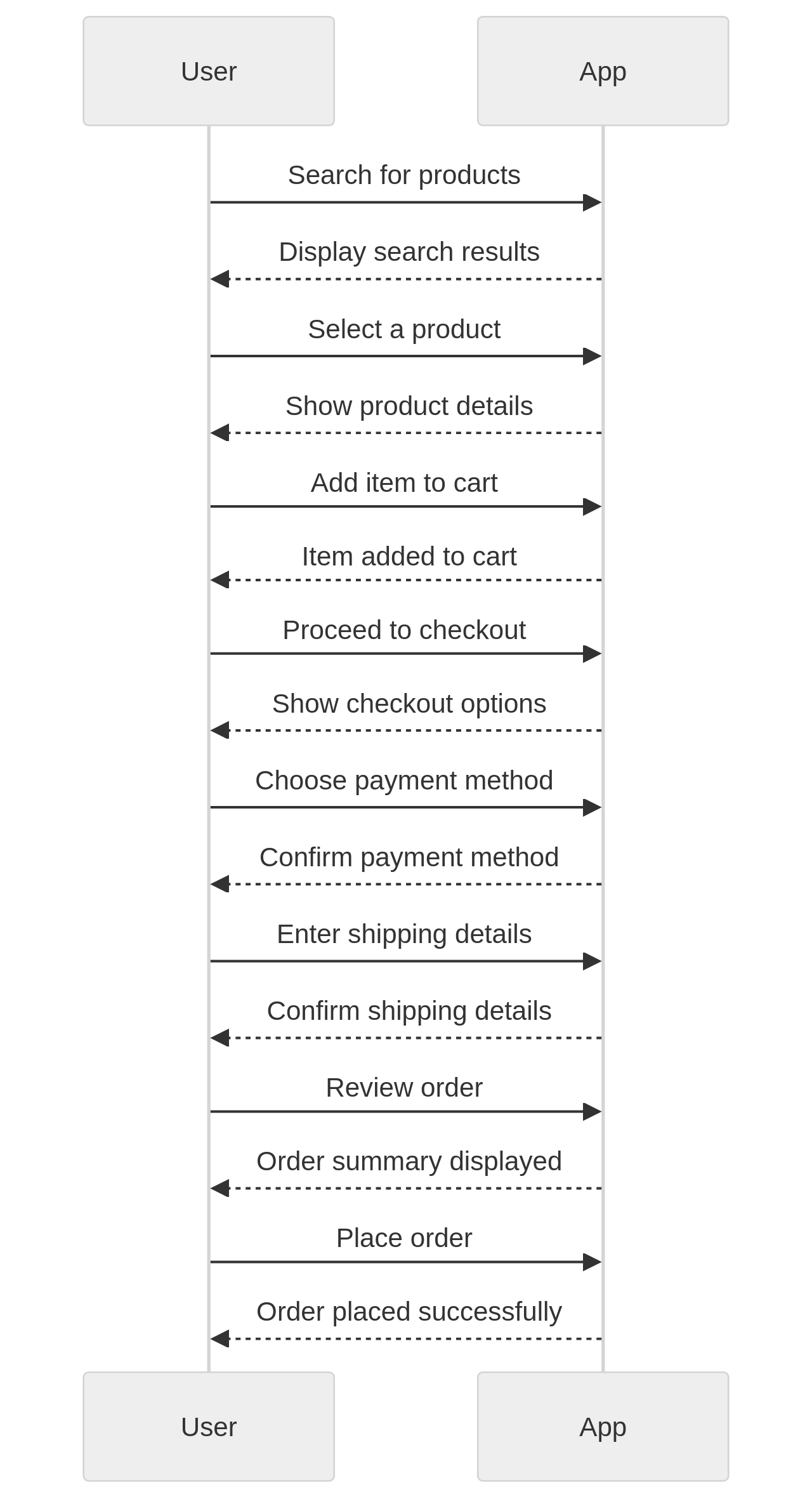Choosing the Best Platform for E-commerce App Development: A Beginner’s Guide
Table of Contents
- Understanding the Importance of E-commerce Apps for Businesses
- Key Features to Consider When Developing an E-commerce App
- Exploring Different Platforms for E-commerce App Development
- Why Choose Appsgeyser for Your E-commerce App Development
- Step-by-step Guide to Creating an E-commerce App Using Appsgeyser
- Tips and Best Practices for Enhancing User Experience in Your E-commerce App
- How to Leverage Your E-commerce App for Business Growth
Introduction
The world of business is rapidly evolving, and e-commerce applications have become a vital tool for businesses to thrive in the digital age. These dynamic platforms enable businesses to showcase their products or services, engage customers effectively, and facilitate seamless transactions. With the increasing use of smartphones and the projected growth of e-commerce, it is crucial for businesses to understand the importance of e-commerce apps and how they can drive growth and success.
In this article, we will explore the significance of e-commerce apps for businesses and the key features to consider when developing one. We will also delve into different platforms available for e-commerce app development and discuss why AppsGeyser is an excellent choice for businesses looking to create their own e-commerce app. Additionally, we will provide a step-by-step guide to creating an e-commerce app using AppsGeyser and share tips and best practices for enhancing user experience in your app. Finally, we will discuss how businesses can leverage their e-commerce app for business growth and scalability. By understanding these essential aspects of e-commerce app development, businesses can harness the power of technology to drive success in the digital marketplace
1. Understanding the Importance of E-commerce Apps for Businesses
The advent of the digital age has paved the way for the rise of e-commerce applications. Serving as dynamic platforms, these applications enable businesses to showcase their products or services, engage customers effectively, and facilitate smooth transactions. They also present an opportunity for businesses to reach a wider audience, increase sales, and improve customer satisfaction.
E-commerce applications can be categorized into four types: business-to-business (B2B), business-to-consumer (B2C), consumer-to-consumer (C2C), and consumer-to-business (C2B). Amazon Business and Alibaba are examples of B2B applications, while Amazon and Domino’s are notable B2C apps. eBay and OLX, on the other hand, are renowned C2C platforms.

The increasing use of smartphones, particularly among tech-savvy millennials and Gen Z, has amplified the need for e-commerce apps. In fact, Nasdaq anticipates that by 2040, 95% of all purchases will be conducted through e-commerce. In 2021 alone, global retail e-commerce sales reached approximately $4.9 trillion.
Developing an effective e-commerce app involves multiple steps, including defining clear objectives, choosing a platform, and creating a minimum viable product (MVP). It is also crucial to regularly update the app to align with evolving customer preferences and market trends.

E-commerce apps should possess key features such as easy registration and login, push notifications, detailed product descriptions, multiple payment options, and integration with websites and social media platforms. Emerging trends in mobile commerce, such as artificial intelligence, big data, and augmented reality, are also shaping the future of e-commerce apps.
However, developing an e-commerce app can be challenging. Issues such as maintaining 24/7 operations, securing data, and optimizing development time can emerge. To address these challenges, businesses can either establish an in-house team to create an e-commerce app or partner with professionals like GeekyAnts, known for their expertise in e-commerce app development.
Partner with GeekyAnts for expert e-commerce app development.
To enhance customer engagement through e-commerce apps, it is essential to adhere to best practices. These include designing a seamless and user-friendly interface, offering personalized recommendations, ensuring a smooth checkout process, and incorporating social media sharing options.

Regularly updating the app with new features and improvements based on customer feedback is also critical to ensure a positive user experience
2. Key Features to Consider When Developing an E-commerce App
Creating an exceptional e-commerce app for Android devices goes beyond just coding; it’s about strategically choosing features that offer an engaging and intuitive user experience, ultimately driving conversions.
A well-designed interface is essential, with high-quality visuals and an organized layout that breeds trust. The onboarding process should be seamless, perhaps using social media integrations for effortless registration and sign-ins.
The shopping cart, a core part of the user experience in e-commerce apps, should be fully developed, enabling users to easily add or remove items, choose colors and sizes, and retain their shopping bag contents across sessions.

Incorporating secure payment systems like Stripe, PayPal, and Braintree is crucial as they form the revenue backbone of the business.
Advanced features such as detailed product galleries, advanced search options, one-click purchases, and even augmented reality integrations can significantly enhance user experience. Personalized recommendations, customer reviews, and excellent customer support channels, like live chat support, a comprehensive FAQ section, and an easy way for users to provide feedback, can boost sales and customer satisfaction.
Push notifications are instrumental in customer engagement and retention. Utilizing platforms like AppsGeyser, you can easily send notifications about new products or discounts, keeping your business relevant to the customer. Personalizing these notifications based on customer preferences and past interactions can capture their attention and prompt action. However, ensuring they are sent at appropriate times and frequencies is vital to avoid disengagement.
Finally, social sharing features can bolster your marketing efforts, enabling users to share favorite products with their networks. This form of word-of-mouth marketing can significantly drive business growth.
In essence, building a successful e-commerce app requires a thoughtful approach to feature selection, focusing on user experience, growth, retention, and sales optimization
3. Exploring Different Platforms for E-commerce App Development
In the bustling world of digital commerce, selecting a suitable platform for e-commerce app development can be a challenging task. The market is flooded with numerous platforms, each with their unique strengths and potential drawbacks. While some platforms are recognized for their extensive customization capabilities, others are appreciated for their user-friendliness and simplicity.
To make an informed decision, you must consider factors such as cost, scalability, and the specific needs of your business. Furthermore, keep in mind that the chosen platform should support essential features such as product catalogs, shopping carts, payment gateways, and customer reviews.
In the realm of e-commerce solutions, there are three main tiers. The top-tier includes platforms like Adobe Commerce (Magento) and Shopify, known for their comprehensive customization capabilities and user-friendly nature. The second tier comprises entry-level platforms such as WooCommerce, Squarespace Commerce, and Wix Shop. The third tier includes intensive platforms like Oracle CX Commerce, HCL Commerce, Salesforce Commerce, and SAP Commerce.
Consider the unique features of each platform. For instance, Adobe Commerce offers high customization, making it ideal for cross-border e-commerce with its multi-store functionality and international customer experience features. Shopify, however, is user-friendly and offers a plethora of templates and themes, facilitating the swift establishment of a basic shop.
On the other hand, BigCommerce is a robust platform with impressive integration capabilities and inventory management features. WooCommerce, a WordPress plugin, is popular among WordPress users but requires a degree of technical knowledge. Squarespace Commerce and Wix Shop are known for their user-friendly interface and aesthetic templates, although their customization options might be limited.
Oracle CX Commerce, HCL Commerce, Salesforce Commerce, and SAP Commerce are powerful systems, offering seamless integration with other systems, such as inventory management and CRM software. However, these platforms come at a high cost and require technical expertise.
In conclusion, your choice of an e-commerce platform should be based on various factors such as business size, customization requirements, and technical expertise. Making a wise decision can significantly impact the success of your e-commerce venture
4. Why Choose Appsgeyser for Your E-commerce App Development
With AppsGeyser, the path to launching your Android applications is simplified, requiring no coding knowledge or fees. The platform offers over 35 free app templates, facilitating the app creation process with detailed tutorials and guides. It’s specifically designed to support small businesses, startups, and visionaries who desire to develop mobile applications quickly and cost-effectively.
AppsGeyser provides a wealth of resources, including insights into over 300 renowned e-commerce apps and collaborations with over 550 tech partners. A variety of categories are available for users to peruse to identify the perfect app to meet their business needs, spanning sales and conversion to customer support and finance.
Given the anticipated surge in mobile commerce by 2025, which is expected to constitute more than 10% of all US retail sales, the demand for efficient e-commerce apps is growing. AppsGeyser responds to this demand with a platform that is easy to navigate and user-friendly.
When it comes to developing e-commerce apps, AppsGeyser stands out with its easy-to-use interface. It incorporates vital features such as push notifications, social media integration, and multiple payment options, ensuring a tailored and efficient shopping experience for mobile users.
Furthermore, the platform supports advanced functionalities like voice search, behavior tracking, and efficient CRM systems, making it a comprehensive solution for e-commerce app development. While the cost of development can fluctuate, partnering with AppsGeyser yields substantial benefits, including 24/7 support, agile development methodologies, and robust data security.
Successful e-commerce apps such as Amazon, Walmart, and Shopify illustrate the vast potential of AppsGeyser. Regardless of whether you’re a small business owner or an entrepreneur, AppsGeyser can be a powerful tool for the seamless development and launch of your e-commerce app. The platform enables users to transform their concepts into fully operational apps without requiring any coding skills. Just follow the instructions and templates available on the website, and make use of the additional features and tools provided by AppsGeyser for app development
5. Step-by-step Guide to Creating an E-commerce App Using Appsgeyser
AppsGeyser, a free app creator, has the power to revolutionize your business’ online footprint, morphing it into an engaging Android app within minutes. Start by choosing from an assortment of over 35 modifiable templates, each designed to meet diverse business requirements. Customize your chosen template to reflect your brand, incorporating elements such as your logo, product visuals, and detailed descriptions.
The next step involves integrating pivotal features, such as payment options, to ensure your customers enjoy a smooth shopping experience. The process of setting up payment options on your AppsGeyser e-commerce app is straightforward. Begin by logging into your account on the AppsGeyser website. Navigate to the app maker page, where you’ll find a section dedicated to managing your app’s payment options. Here, you’ll be able to configure the payment methods you wish to offer to your users, following the instructions provided by AppsGeyser to integrate your preferred payment gateway or service into your app.
Once you’re satisfied with your app’s design and functionality, it’s time to make it publicly available on the Google Play Store. However, AppsGeyser is more than just an app creation tool; it’s a comprehensive platform that offers resources at every stage of the app creation journey. From in-depth tutorials to a supportive knowledge base, you have access to help whenever you need it.
The AppsGeyser platform is user-friendly, requiring no coding expertise or additional software downloads, making it a cost-effective solution for small businesses, startups, and entrepreneurs who wish to enter the mobile app arena without the hassle of lengthy development processes.
AppsGeyser also offers monetization opportunities through various channels such as advertising, referral marketing, in-app purchases, subscriptions, sponsorships, and data collection. With a track record of over 10 million apps created, AppsGeyser is a proven platform for launching your e-commerce app.
In less than 10 minutes, your website can be transformed into a dynamic Android app, ready to elevate your customer’s shopping experience and propel your business growth
6. Tips and Best Practices for Enhancing User Experience in Your E-commerce App
Enhancing your e-commerce app’s user experience extends beyond a stylish and user-friendly interface. Indeed, a well-structured layout and easy navigation are vital, yet the implementation of advanced search functions can significantly streamline product discovery. For instance, a thesaurus search can broaden the search parameters by identifying synonyms to the user’s input, thereby increasing the likelihood of a successful product match.
While detailed product descriptions and high-quality images are fundamental, never underestimate the value of a high-performing app. Slow loading can frustrate users, possibly leading to abandoned shopping carts and missed sales opportunities. Therefore, a swift, responsive app is a crucial element in user satisfaction.
Consider adding advanced search strategies, such as search phrases, boolean operators, and wildcard symbols. These tools can assist users in formulating more accurate search requests, enhancing their overall experience. For example, enclosing phrases in quotation marks can identify exact matches, while boolean operators like ‘and’, ‘or’, and ‘not’ can fine-tune search results by combining or excluding keywords.
Lastly, exceptional customer service is a critical component of any thriving e-commerce app. Be prepared to promptly and effectively address user issues. By focusing on these areas, you can greatly improve your e-commerce app’s user experience.
To find examples of successful e-commerce apps with superior user experience, conduct research and analyze the highest-rated e-commerce apps currently available. These apps typically feature intuitive user interfaces, seamless navigation, personalized recommendations, secure payment options, and efficient customer service. By examining the features and design elements of these apps, developers can gain insights into what contributes to an e-commerce app’s success and incorporate those elements into their own app development process
7. How to Leverage Your E-commerce App for Business Growth
E-commerce applications are a powerful tool for expanding your business. Their convenience attracts customers, aiding in customer retention. These apps are a data goldmine, offering vital insights into consumer behavior and preferences, which can help fine-tune your business strategy.
Promoting your e-commerce app through various marketing mediums can broaden your reach. Regular app updates, incorporating user feedback and keeping up with market trends are crucial.
As your e-commerce venture grows, planning for scalability becomes critical. This may include automating certain tasks or outsourcing, saving time and resources. Customer service should always be prioritized. As the customer base grows, hiring additional staff to meet increased demand might become necessary.
Regularly reviewing and adjusting pricing strategies is key to maintaining profitability as the business expands. Marketing strategies should also be assessed and adjusted as necessary to ensure effectiveness and good ROI.
In terms of scaling, establishing a strong foundation and pursuing continuous improvement is crucial. This can include SEO optimization, designing an email marketing strategy, prioritizing customer service, and creating a well-structured sales funnel. Driving momentum and automation may involve leveraging customer reviews, using remarketing strategies, considering outsourcing, and promoting user-generated content.
Planning for potential supplier issues, preparing for sales plateaus and declines, and laying the groundwork for growth are all part of the scaling journey. Automation, adaptation, and pivoting are essential to success. Tools like Google Ads and Facebook ads can boost traffic to your online store, while building a loyal customer base through personalized customer service and loyalty programs can foster growth.
Incorporating payment gateways in your e-commerce app is another key step. Choosing a suitable payment gateway provider that supports your app platform and meets your needs is the first step. You then create an account with the chosen provider and obtain the necessary API credentials. The next step is implementing the required code in your e-commerce app to integrate the payment gateway using the provided API. This typically involves handling payment requests, processing responses, and securely transmitting payment data. Thorough testing is crucial to ensure the payment gateway functions correctly in your e-commerce app.
Remember to always plan for challenges, think big, and strive to turn your business into a million-dollar e-commerce brand
Conclusion
The world of business is rapidly evolving, and e-commerce applications have become a vital tool for businesses to thrive in the digital age. These dynamic platforms enable businesses to showcase their products or services, engage customers effectively, and facilitate seamless transactions. With the increasing use of smartphones and the projected growth of e-commerce, it is crucial for businesses to understand the importance of e-commerce apps and how they can drive growth and success.
E-commerce apps offer numerous benefits for businesses. They provide an opportunity to reach a wider audience, increase sales, and improve customer satisfaction. The convenience and accessibility of e-commerce apps make them an essential tool for businesses in today’s digital marketplace. By developing an effective e-commerce app with key features such as easy registration, push notifications, detailed product descriptions, multiple payment options, and integration with websites and social media platforms, businesses can enhance their online presence and drive success.
To leverage the power of e-commerce apps for business growth, it is important to focus on enhancing user experience through best practices such as designing a seamless interface, offering personalized recommendations, ensuring a smooth checkout process, incorporating social sharing options, and providing excellent customer support. Regular updates based on customer feedback and market trends are also crucial. By choosing a suitable platform for e-commerce app development like AppsGeyser, businesses can simplify the creation process and benefit from its user-friendly interface and robust features. Start now with AppsGeyser to create your own e-commerce app and harness the power of technology to drive success in the digital marketplace.
